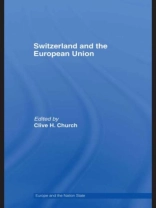Despite its geographical centrality and its considerable economic involvement in Europe, Switzerland remains unusual in that it is neither a member of the European Union or the European Economic Area. At a time when the Union is both expanding and seeking to develop its integration, the country constitutes a real anomaly amongst west European states.
This book demonstrates the range, depth and complexity of Switzerland’s developing relations with Europe and provides detailed and up-to-date information on Switzerland itself. Considering a variety of dimensions of the country and its ambiguous relations with the EU, the contributors, all of whom are leading specialists on Swiss-EU relations, explore:
- the classical political obstacles to entry: federalism, direct democracy, neutrality and the growing strength of anti-European populism
- policy barriers to integration: in trade and economics generally, in financial matters, and in social provisions relating to the movement of people
- the negotiation of the two sets of bilateral accords which presently structure Swiss relations with the Union
- the EU response and the prospects for future Swiss-EU relations.
Switzerland and the European Union will appeal to specialists on Switzerland, academics and students in politics and international relations, and practitioners in European integration and Swiss politics.












